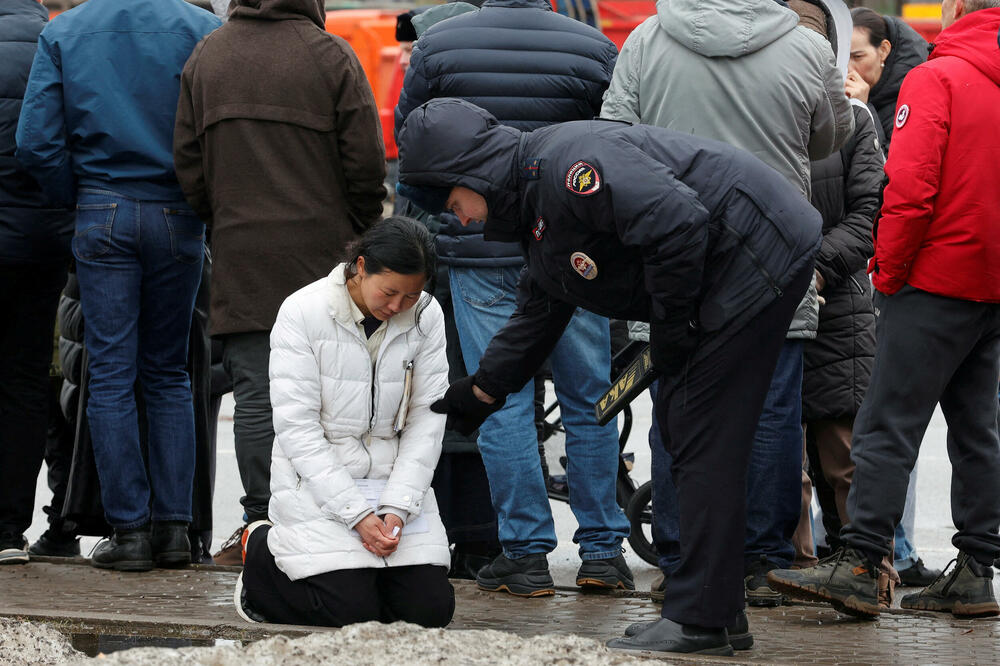Russian President Vladimir Putin suggested yesterday that the terrorists who killed at least 133 people Friday night at a concert hall on the outskirts of Moscow had help from Ukraine.
Russia announced yesterday that it had arrested all four attackers suspected of having committed the massacre in Crocus Hall, and Putin said that the organizers of the attack would be caught and punished. The Russian Ministry of Foreign Affairs announced that all the detained suspected attackers are foreign nationals.
The Islamic State extremist group claimed responsibility for the attack on Friday evening, but there are strong indications that Russia is pushing for a Ukrainian connection, despite categorical claims by Ukrainian officials that Kiev had nothing to do with it, Reuters reported.
The Russian State Investigative Committee announced that 133 people were killed, while the editor of the state television, Margarita Somonyan, without specifying the source, stated earlier yesterday that the number of victims was 143.
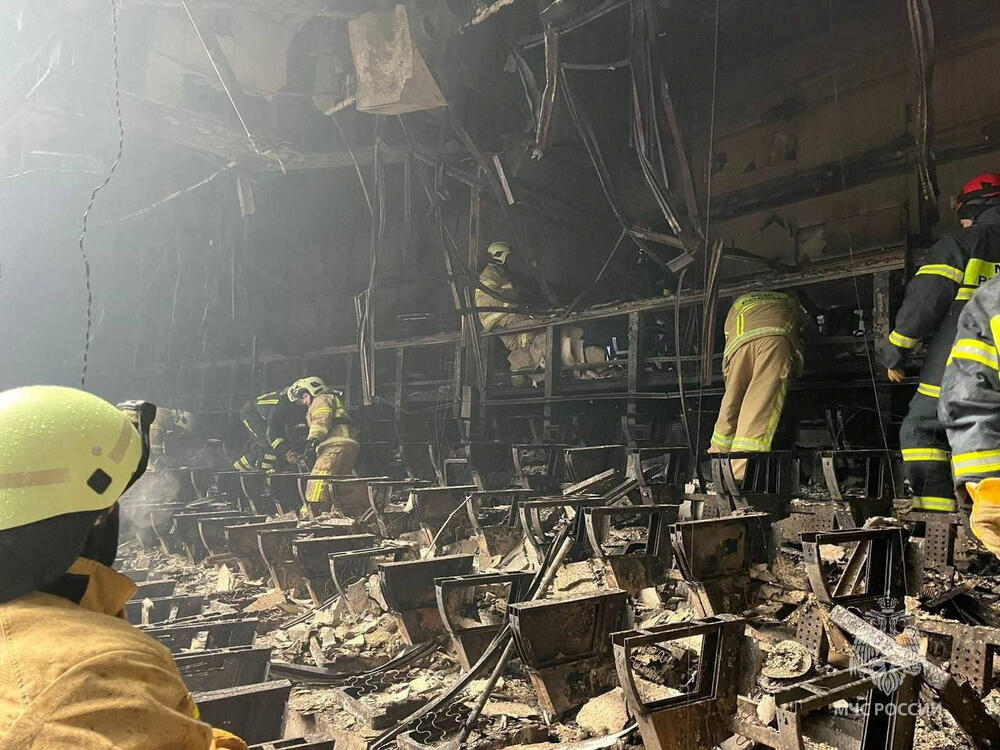
In a televised address, Putin said that 11 people were detained, including the four attackers. "They tried to hide and went towards Ukraine, where, according to preliminary data, there was a ready window on the Ukrainian side for them to cross the border," he said.
Russia's Federal Security Service (FSB) said the attackers had contacts in Ukraine and were caught near the border. Neither Putin nor the FSB have publicly presented any evidence of ties to Ukraine, with which Russia has been at war for the past 25 months.
Ukrainian military intelligence spokesman Andriy Yusov told Reuters: "Of course, Ukraine is not involved in this terrorist act. Ukraine is defending its sovereignty against Russian invaders, liberating its territory and fighting against the occupying army and military targets, not civilians."
He said that the version of the FSB that the suspects were arrested on the way to Ukraine is "of course another lie of the Russian special services".
Putin said that the enemy is "international terrorism" and said that he is ready to cooperate with any country that wants to defeat it.
"All the perpetrators, organizers and those who ordered this crime will be justly and inevitably punished. Whoever they are, whoever directed them," said Putin. "We will identify and punish everyone who is behind the terrorists, who prepared this crime, this attack on Russia, on our people".
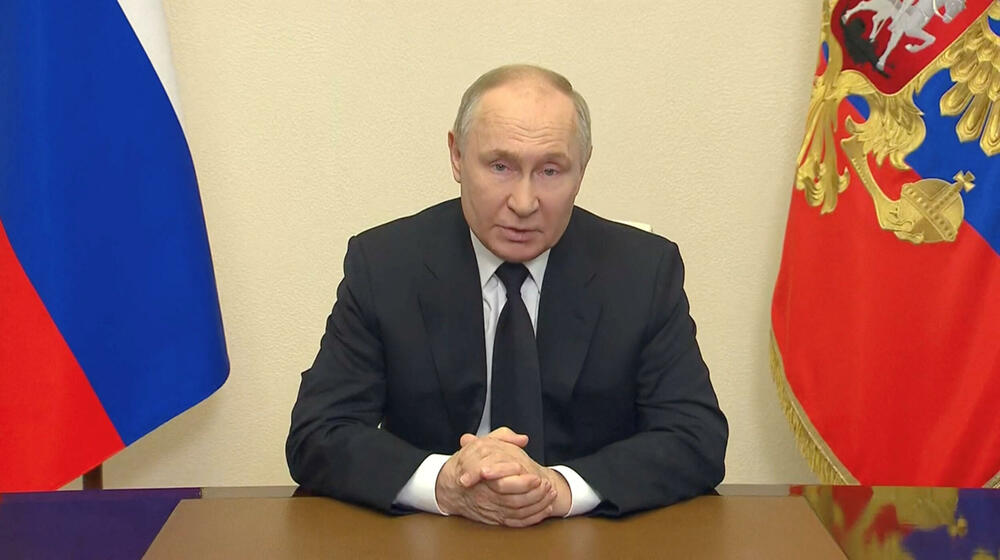
Influential Russian MP Andrey Kartapolov said that if Ukraine is involved, then Russia must provide a "clear and concrete" answer on the battlefield.
A security breach?
Some commentators on Russian social networks yesterday questioned how the authorities, which tirelessly suppress all kinds of opposition activities and stifle independent media, failed to prevent the attack despite warnings from the US. Moscow is considered one of the European cities with the strongest surveillance and security measures. Some commentators also question the reaction of the authorities after the assailants broke into the hall, where they wreaked havoc for a significant period of time and even managed to escape from the building.
Footage from Friday, the authenticity of which has been confirmed, shows attackers in camouflage opening fire with automatic weapons on attendees at the Krokus Hall near the capital. Investigators said some of the victims died from gunshot wounds, while others died in a massive fire that broke out in the building. Reports say the attackers started the fire using fuel from canisters they were carrying in their backpacks.
People were running away in panic. The Baza portal with contacts in the Russian security services announced that 28 bodies were found in the toilet and 14 on the staircase. "Many mothers were found hugging their children," it said.
Russian MP Alexander Kinstein said that the attackers fled in a Renault vehicle that the police spotted in the Bryansk region, about 340 kilometers southwest of Moscow, on Friday evening. He said that a pistol, ammunition for automatic weapons and passports from Tajikistan were found in the car. Tajikistan is a Muslim-majority Central Asian country that was once part of the Soviet Union.
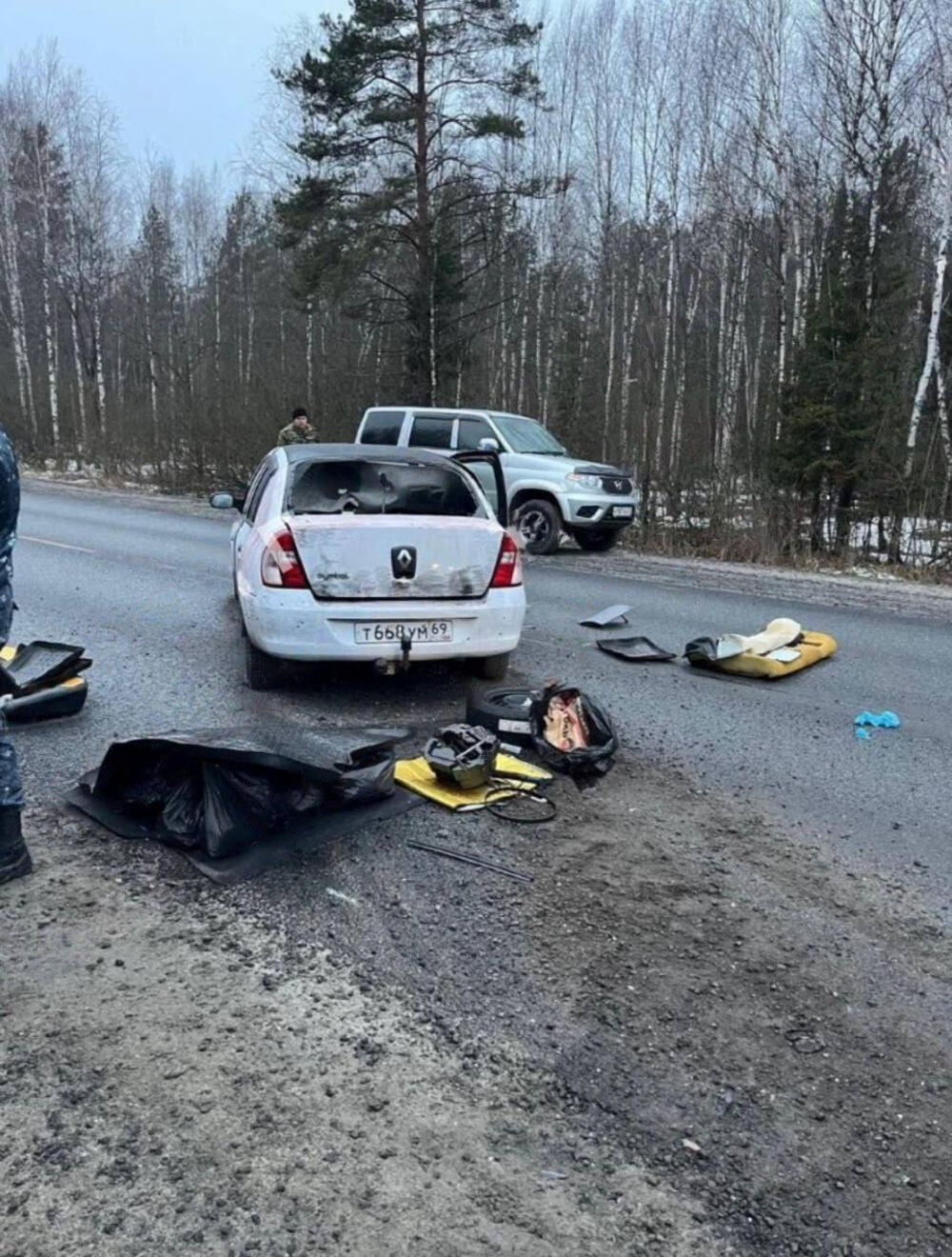
Television editor Simonjan showed a video showing one of the suspects, a young man with a beard, aggressively interrogating him while he answers in Russian with a strong foreign accent. He said that he arrived from Turkey on March 4 and that he received instructions from unknown persons via Telegram to carry out the attack in exchange for money. Another man is shown with cuts and bruises on his face as he is questioned through an interpreter, sitting on a bench with his hands and feet tied.
The Kremlin announced that it had a conversation with the leaders of Belarus, Uzbekistan, and Kazakhstan, in which all parties confirmed their willingness to cooperate in the fight against terrorism.
The United States, European and Arab powers and many former Soviet republics expressed shock and offered condolences. The United Nations Security Council condemned the "heinous and cowardly terrorist attack".
US Secretary of State Anthony Blinken said yesterday that the US condemns terrorism in all its forms. "We send our deepest condolences to the families and loved ones of the victims and all those affected by this heinous crime. We condemn terrorism in all its forms and stand in solidarity with the people of Russia in pain over the loss of life in this horrific event," Blinken said in a statement.
Long lines of people who wanted to donate blood formed in Moscow yesterday. Health authorities said more than 120 people were injured.
Putin dismissed the warnings
The Islamic State, an extremist group that once controlled large swathes of Iraq and Syria, claimed responsibility for the attack, the Amaq news agency reported on Telegram. IS said its fighters attacked in the suburbs of Moscow, "killing and wounding hundreds and causing widespread destruction before they safely retreated to their bases." The statement did not provide further details. Yesterday, the group published a photo in which it claims to be the four attackers.
The United States has information confirming IS's claim of responsibility for the attack, a US official said. That official, who wished to remain anonymous, said that Washington "adequately" warned Moscow in recent weeks about the possibility of an attack.
Friday's attack, about 20 kilometers from the Kremlin, came two weeks after the US embassy in Russia warned that "extremists" were planning an attack in Moscow.
Hours before the warning from the embassy, the FSB said it had prevented an attack on a Moscow synagogue by IS's branch in Afghanistan, known as ISIS-Korason, or ISIS-K, which wants to form a caliphate on the territory of Afghanistan, Pakistan, Turkmenistan , Tajikistan, Uzbekistan and Iran.
As the Associated Press reports, only three days before the attack, Putin publicly rejected Western warnings about a potential terrorist attack as an attempt to intimidate the Russians. "Everything looks like open blackmail in an attempt to intimidate and destabilize our society," he said at a meeting with leading security officials.
Putin changed the course of Syria's civil war when he intervened in 2015 to support Syrian President Bashar al-Assad against the opposition and Islamic State.
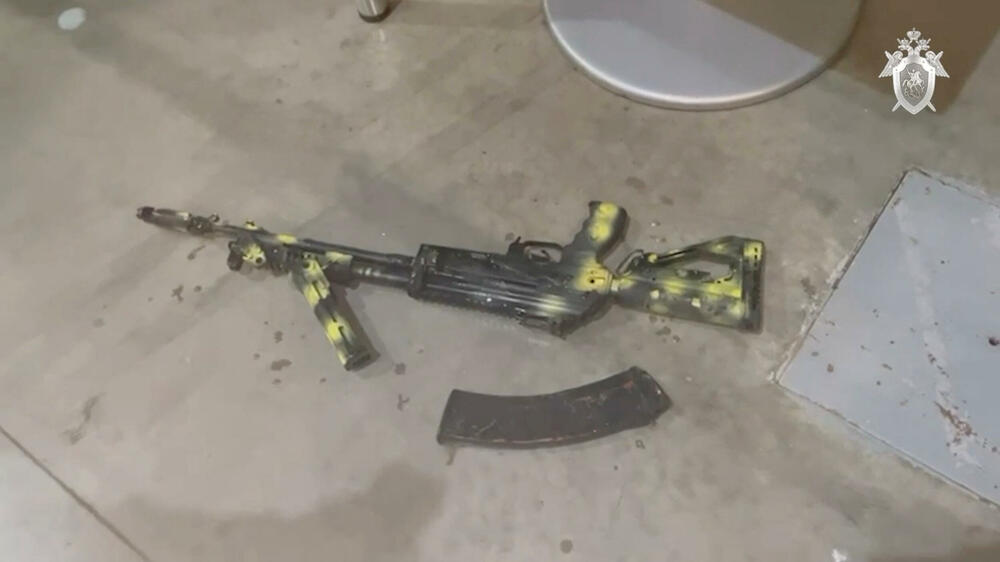
"ISIS-K has been focused on Russia for the past two years, often criticizing Putin in its propaganda," Colin Clark of the Soufan Center, a New York-based think tank, told Reuters.
Islamic State has claimed responsibility for attacks across the Middle East, Afghanistan, Pakistan, Iran, Europe, the Philippines and Sri Lanka, and has also been involved in some of the biggest terrorist attacks in Russia, including the St. Petersburg subway bombing that killed 15. person, and 45 were wounded.
The ISIS-K group is mainly based in Afghanistan, and was formed in 2015 by members of other militant groups, including those from Pakistan and Uzbekistan, writes the British "Guardian". It is active in Central Asia and Russia and in January carried out two bombings in Iran in which almost 1000 people died.
"ISIS-K and its allies have a foothold in Afghanistan and continue to develop their networks in and out of that country," said General Michael Kurila, commander of US Central Command, during testimony in the House of Representatives in early March.
"Their aim is not to stop there. They have called for global attacks on anyone not associated with their extremist ideology, and the Taliban's efforts to suppress the group have proven insufficient."
The attack in Iran demonstrated the group's "resilience and indicates that they still have the capacity and will to carry out spectacular operations abroad."
ID's claim is credible, but there are discrepancies
Most security experts believe that the IS claim to be behind the attack in Moscow is credible, Reuters reported.
However, one leading expert said that it was unusual and striking that the attackers made and implemented an escape plan instead of continuing their murderous rampage until they were killed themselves.
Adam Dolnik, a Czech security expert who has studied previous Islamist attacks in India, Kenya, Russia and elsewhere, said the IS claim seemed credible, though that "will not stop the Russians from using the attack for their foreign policy agenda regarding Ukraine." and the West".
In a telephone conversation with Reuters, Dolnik said that such attacks are typical of IS and Al Qaeda's way of operating in recent years. However, one element is unusual, and that is the fact that the perpetrators planned to escape - unlike typical attacks by Islamist extremists in which the perpetrators are ready to die and expect to be killed by the security forces in the end. Dolnik added that the execution of the attack and the escape show a high degree of planning and coordination.
Jasin Mušarbaš, a German journalist and security expert, said that the language, content and communication channels used to claim responsibility show that it definitely comes from the Islamic State.
In a post on the X network, he said that this does not mean that it is absolutely true that the group carried out the attack, but that it is feasible.
It happened that in the past, militant groups took responsibility for attacks carried out by others, if they corresponded to their targets and propaganda goals.
Peter Neumann, another German security expert, told Reuters that the claim of responsibility, the mode of operation and the alleged participation of Muslim attackers from former Soviet Central Asia, as well as the fact that the US warned of an "extremist attack" in Russia point to IS.
"Bottom line: Not Putin, not Ukraine. ISIS did it," he posted on the X network.
Fleeing from bursts and fires
Four armed men slowly approached the metal detectors at the entrance to the Crocus Concert Hall, firing automatic weapons at the terrified and screaming civilians.
Nearby, one witness, Natalija, had just taken off her coat and was standing in line at the inner entrance of the 6200-capacity concert hall in Podmoskovlje, where the Soviet-era rock group "Piknik" was scheduled to perform.
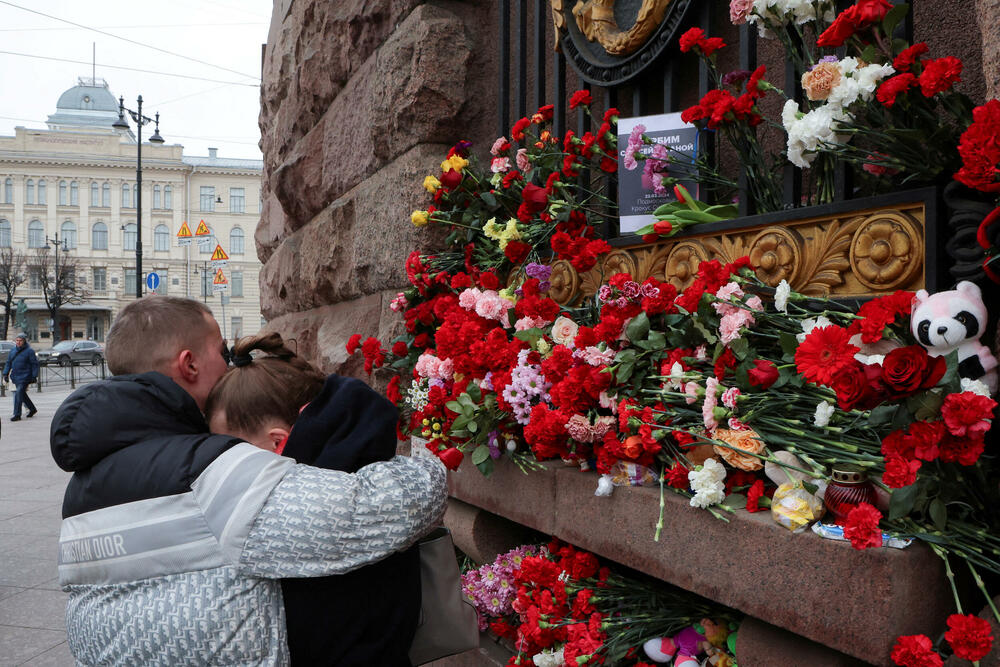
"The shots came from behind," Natalia told Reuters. She was about to enter the hall. "It was loud, like firecrackers, fireworks, but automatic. I heard it right behind me," Natalija said. Then she started to run for her life.
"Everybody was screaming, everybody was running," she said. She ran to a nearby subway station without her coat. "I felt terrible. It was just a nightmare."
The attackers, dressed in camouflage with combat vests in which they had extra ammunition, arrived at Crocus Hall around 7.40:XNUMX a.m. local time in a van, exited the back door and headed for the entrance with weapons, eyewitnesses said.
They shot directly through the glass at the main entrance, shooting at anyone who got in their way. Dozens of bodies, some in pools of blood, lay motionless on the marble floor at the main entrance.
After killing people at the entrance, the attackers entered the hall where hundreds of people were sitting waiting for the concert to begin.
"Some people thought it was some kind of special effects," Anastasia Rodionova told Reuters. "Then I saw people falling and the shooting from automatic weapons started."
"Your survival instinct kicks in, your eyes widen, where do I run? Then someone shouted: get up - don't lie down because they're going to kill us all".
Rodionova said that some men managed to break down the door to the street and ran away.
From the speakers it was heard that the concert was canceled for "technical reasons" and that people should leave the hall.
In the footage, people can be seen running screaming towards the exits as gunfire is heard.
"They started shooting at us. I fell to the floor," said one injured woman from a hospital in Moscow. She crawled to the exit. "The girl next to me was killed".
Russian investigators said the attackers started a fire in the building, and witnesses described pouring some liquid on the seats and curtains in several places before setting it on fire.
Eyewitnesses also talked about how they tried to break through the fire, while some of their clothes were melting, in order to save themselves from the fire, which quickly spread to an area of 12 square meters.
The roof collapsed and hundreds of firefighters fought for hours to contain the flames that engulfed the entire hall. All that remains are the iron supports and steel frames of hundreds of seats.
Whole families died, and bodies of children were found in the arms of their lifeless mothers.
Bonus video:



